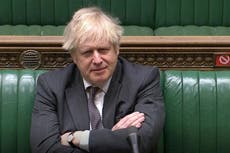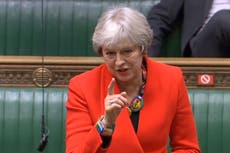Both Boris Johnson and Keir Starmer face a tricky path ahead over the Brexit deal
The rapid passage of the bill without the microscopic scrutiny usually given to EU matters will not end the debate for either party leader

Although the next general election might well be four years away, Boris Johnson and Keir Starmer began to rehearse their lines today as the Commons debated the EU (Future Relationship) Bill implementing the UK-EU trade deal.
The prime minister, displaying his characteristically casual relationship with the truth, claimed the Labour leader would seek a mandate in 2024 to “rewrite the deal.” He said: “We got Brexit done. Let’s keep Brexit done.” An election slogan, surely.
Later he went even further, claiming that taking Britain back into the EU remains Starmer’s agenda.
It doesn’t, but that won’t stop Johnson from saying it. Starmer insisted that “the Leave-Remain argument is over” and that “the divisions are over,” but unfortunately for him, they remain in his own party.
Johnson was in a stronger position than Starmer going into today's debate after the European Research Group backed his deal, meaning the Labour rebellion against Starmer’s edict to vote for the deal will likely be bigger than the Tory one against it. Some allies of Jeremy Corbyn enjoy a touch of schadenfreude as they watch Starmer wrestling with the same internal divisions Corbyn did.
However, while Corbyn impaled himself on the fence, saying he would be neutral in the Final Say referendum he reluctantly backed, Starmer displayed stronger leadership by backing Johnson’s deal rather than abstaining, a course which would have united his party.
Starmer’s critics argue that he will never be able to criticise the deal's impact because Johnson will now be able to tell him: "You voted for it.” Backing it also causes problems for Labour in Scotland, playing into the SNP’s hands when Labour has only one Commons seat and desperately needs to mount a fightback.
While today's approval of the deal by parliament will provide a short-term boost for Johnson, Starmer is wisely playing a long game, telling the voters in the red-turned-blue wall his party needs to win back that Brexit is now in the past. Private polling for Labour showed 50 per cent of people would react favourably if Labour voted for a deal, compared to 22 per cent if the party voted against and 18 per cent if Labour abstained.
A good question for any party leader if to ask is: “What would my opponent least like me to do?” and then do it. Johnson would have loved Labour to oppose the deal, so Starmer is right to vote for it.
But will Leave voters be prepared to forgive and forget? Starmer will need to earn their trust, notably on the economy. In his favour is that Brexit was a symbol of much wider grievances about being left behind by globalisation and a London-centric governing class. Johnson will be judged on his other 2019 pledge to "level up" rather than on an issue in the rear-view mirror.
Starmer is making the right opening moves by saying a Labour government would not seek to renegotiate Johnson’s deal. That will disappoint pro-Europeans in Labour’s ranks, who would like to see a pledge to rejoin the customs union and/or single market.
However, doing so would make Brexit a big issue at the next election, reviving the spectre of free movement and the role of the European Court of Justice, which would blunt Labour’s appeal in the blue wall and advertise the party’s divisions.
Labour has promised to “build on” the “foundation” of Johnson’s agreement. I’m told it will propose tweaks rather than big changes, in line with Labour’s policy commitments on workers’ rights and environmental standards, on which it would go further than the Tories.
Labour will emphasise the practical: for example, negotiating access to real-time data sharing from the EU’s Schengen information system to boost the fight against crime.
The rapid passage of the bill without the microscopic scrutiny usually given to EU matters will not end the Brexit debate for either main party leader. Starmer will come under Tory and media pressure to explain precisely how he would "build" on what he called the “foothold” of Johnson's deal, which will be politically tricky. Johnson will have to make many decisions on whether to live up to his pledge in today's debate to be "the best friend and ally the EU could have".
A more likely scenario is that the estimated 30 committees and bodies set up to implement the deal become a constant source of tension and conflict as the many loose ends left by the last-minute agreement are tied up.
Important issues remain on the table, including financial services, data, mutual recognition of professional qualifications and travel visas for groups such as musicians and artists.
The deal is only the end of the beginning. Despite Johnson's triumphalism today, Brexit is still only half “done”.
Join our commenting forum
Join thought-provoking conversations, follow other Independent readers and see their replies
Comments





Bookmark popover
Removed from bookmarks